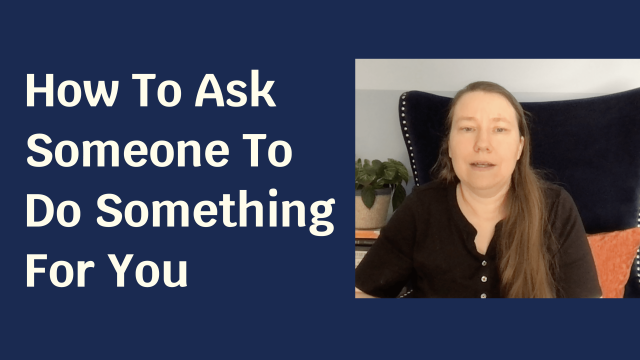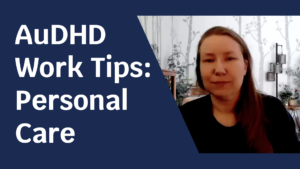
Do you need to ask for something to be done?
Today’s topic is asking someone to do something for you. That’s a situation we all have faced over and over throughout our lives, and there are lots of ways that you can approach this with a wide variety of different reactions from the other person.
I’m going to discuss an approach that I’ve pieced together over time and find particularly effective at both getting help in the moment and maintaining a good enough relationship that they’re willing to help me again in the future or be nice to me, so that we can live and work peacefully together. The whole key to it is this:
First, clarify for yourself the purpose of the interaction. That might seem strange, but bear with me. Say you’re living close to someone in a dorm, or in an apartment house, and your neighbor is playing loud music late at night that’s keeping you from sleeping. You want to ask them to turn the music down. Before you walk over there, clarify in your own mind what you’re trying to accomplish.
That might seem obvious: you want the music turned down. But think about it this way, you’re going to be living next to this person for a while. Probably having other interactions that you would like to go well, and you might need something else from them in the future. If they’re irritated or upset with you, they’re less likely to do other things in the future that you might want or need. How you approach this is going to make a difference.
So is your purpose here to get them to turn down the music? Or is it to get good sleep and maintain a good relationship with your neighbor?
So is your purpose here to get them to turn down the music? Or is it to get good sleep and maintain a good relationship with your neighbor? If your purpose is just to get your neighbor to turn their music down because it’s late and you want to sleep, you could do a variety of things that might work. You could bang on the wall, scream at them, ring the doorbell over and over, complain, call the cops, yell at them, rant about how you have to be at work early or how you have a test tomorrow, call them names, any or all of those might get them to turn the music down. To that end, those could, in fact, accomplish your objective but you’re probably not going to have a good long term relationship with them because they’ll be annoyed, upset or angry at you.
Instead, if your purpose is to maintain a good working relationship while getting good sleep, you can approach it in a different way. That doesn’t mean you have to be a doormat, please don’t, but you can walk next door, knock on the door and say something like, “Hey, I’m trying to get some sleep, the music is loud and preventing me. Could you turn it down?” And that leaves room for discussion, for a relationship long term. That gets you what you want in the moment and, in the long term, a good relationship with the other person.
Hopefully they’ll say “Oh yeah, sorry dude! I didn’t realize that.” And they turn the music down. Now I realize it’s not always going to happen like that, but you might be surprised at how often it does.
So what do you say in that moment? Let’s talk about that for a minute.
The Six Steps
Here are six steps:
- Step 1, clarify your purpose.
- Step 2, pick your timing.
- Step 3, be specific about what you’re wanting.
- Step 4, say how it will help you.
- Step 5, say thank you.
- Step 6, follow up later with telling them how their help impacted you.
Step one, clarify your purpose. Do you want a short term benefit or a long term relationship?
Step two, pick your timing. Sometimes the time is obvious, like music late at night (just go over there). But if it’s not urgent, pick a time that they’re more likely to be open to what you have to say, not when they’re in the middle of something that’s holding their attention. Not in the middle of a TV show, while they’re cooking dinner, or doing a work project. Pick transition times, break times and, if you can manage it, pick times preferably when they’re in a good mood.
Most of the time, people don’t actually know what we want, need, think or feel unless we tell them.
Step three, be specific about what it is you’re wanting. It’s very easy to fall into the trap that other people know what we want and need without us having to tell them. This is incredibly common, psychologists call it the illusion of transparency, but it’s also incredibly wrong. Most of the time, people don’t actually know what we want, need, think or feel unless we tell them. So if you say “Hey, the music’s loud.” They may not pick up on the fact that you want them to turn it down. They might think “Yeah, it’s so great.” So tell them specifically what you need.
(There’s more to this, which I’m going to get into in a different video, but there is a difference between a need and a specific strategy to fulfill that need. For example, you need to get sleep. One strategy is to turn the music down, another strategy could be to put in earplugs. Again, that’s another huge topic and I’ll get into it in another video.)
Step four, tell them how it will help you. Give them a reason to help. I read a fascinating study in which researchers would go to the front of long lines at coffee machines and in supermarkets, they would go up to the first person in line and ask them to cut in line. If the researcher gave a reason they were much more likely to be allowed to cut in line, even in the front of a really long line.
The reason didn’t have to be all that persuasive or important. Even when they just said, “Can I cut, cuz’ I really need to go?” That was often enough. But the better the reason, the better the interaction. The point here is that if you give someone a reason to help, they’ll be much more likely to help. Most people really are happy to help if they know why.
Step five, say thank you. Someone just did something that they didn’t have to do for your benefit, at the very least that deserves an acknowledgement. Saying “thank you” when they did something for you, at your request, creates a feeling of goodwill that is important if you’re trying to build or maintain a relationship with this person.
Most people are happy to help, but they’re much happier when they see that the effort that they put in actually made a difference for you.
Step six, follow up later by telling them how their help impacted you. After you’ve gotten benefit from whatever it was that they did, let them know what that benefit was. Most people are happy to help, but they’re much happier when they see that the effort that they put in actually made a difference for you. Everyone likes to know that when they put effort into something it has a positive effect. That’s the same thing here.
If you tell them that you were able to sleep better and had a good meeting at work the next day, or whatever it was that was better because of their help, it’s like having that simple “thank you” on steroids. They’ll feel much more warmly towards you and be much more likely to help you in the future, and other interactions will be a lot easier as well.
One more example
Alright, so those are the six steps. Let’s look at these in one more example. Say you’re working in an office and someone in the cubicle next to you often wears a lot of perfume or aftershave, and the smell is very intense and it’s bothering you.
Remember the key: Is the goal of your interaction to have them wear less perfume or aftershave? Or is it to have a good working relationship with someone that you’ll be interacting with on a daily basis, for potentially quite a long time, as well as being able to breathe in their presence?
If your goal is a good working relationship while breathing: pick a time that they are more likely to be open to what you have to say. During a break, not in the middle of them working on a project, and then ask them for what you want. That might look something like this, “Hey Julia. That’s a lovely perfume you’re wearing, it’s a little intense though, and I actually have a hard time breathing sometimes because there’s so much of it. Would you mind wearing less in the future? Or maybe going without?”
Keep your explanation brief and don’t go on and on. There will probably be a couple of comments back and forth between you, and that’s fine. If you expand at length about how big of a deal it is for you, that doesn’t make them feel good about it, it doesn’t make them feel good about themselves, and it doesn’t accomplish the goal of having a positive working relationship with this person.
Following up with them sort of completes the circle. It shows them that something that they did had a positive impact on another person.
If they agree to wearing less perfume, or if you can negotiate some other idea that might be able to help, that’s great! Be sure to thank them for helping, and then the next day, if they come into the office with less perfume or whatever compromise that you’ve actually worked out, follow up with them, say “thank you for helping” and tell them specifically how it impacted you. Something like, “It’s so much easier for me to breathe and I can get my work done. Thank you again so much.” Again, it doesn’t have to be a long thing.
Following up with them sort of completes the circle. It shows them that something that they did had a positive impact on another person and that creates good feelings, which means that they’re more likely to help you in the future or think positively towards you. Hopefully by creating a positive working relationship, you’ll both find benefits both now and later.
Alright, that’s enough on this topic for now. This strategy has worked surprisingly well for me. I didn’t think that these little things would make so much of a difference but they did. Anyway, there’s no need to take my word for it, I invite you to try this out for yourself and see how it goes for you.




